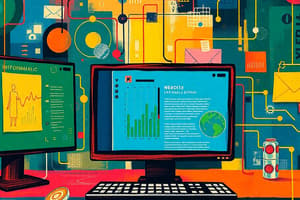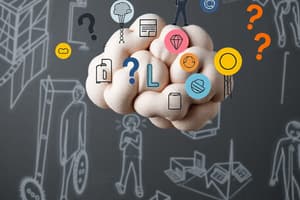Podcast
Questions and Answers
What is communication?
What is communication?
A process by which information is exchanged between individuals through a common system of symbols, signs, or behaviors.
Which of the following are basic types of communication?
Which of the following are basic types of communication?
- Visual Only
- Non-Verbal (Written)
- Verbal (Oral)
- Both A and B (correct)
The element of communication that includes the person who receives the message is the ______.
The element of communication that includes the person who receives the message is the ______.
Receiver
What does 'decoding' refer to in communication?
What does 'decoding' refer to in communication?
Noise can refer to both literal and figurative disturbance in communication.
Noise can refer to both literal and figurative disturbance in communication.
What is media literacy?
What is media literacy?
What does technology (digital) literacy entail?
What does technology (digital) literacy entail?
Which age is described as the time when the transistor was invented?
Which age is described as the time when the transistor was invented?
Which of the following is an example of media from the Pre-Industrial Age?
Which of the following is an example of media from the Pre-Industrial Age?
What invention helped usher in the electronic age?
What invention helped usher in the electronic age?
Flashcards are hidden until you start studying
Study Notes
Media and Information Literacy
- Communication Definition: Exchange of information using symbols, signs, or behaviors.
- Types of Communication:
- Verbal (Oral): Spoken language.
- Non-Verbal (Written): Includes signs, symbols, gestures, and facial expressions.
Elements of Communication Process
- Source: Origin of the message; the sender decides what to transmit.
- Encoding: Translating the message for transmission.
- Transmitting: Sending the message, using vocal cords and gestures.
- Channels: Technologies that enable message transmission.
- Decoding: Receiver interprets the sender's message.
- Receiver: Individual who receives the transmitted message.
- Feedback: Response generated by the message received.
- Noise Interference: Any disruption during the communication process.
Osgood-Schramm Model of Communication (1954)
- Views communication as a circular process involving both sender and receiver.
Media
- Definition: Plural of medium, functioning as channels of communication, covering art, news, education, and various information forms.
Types of Literacy
- Media Literacy: Skills to access, analyze, evaluate, and create different media formats.
- Information Literacy: Recognizing the need for information and effectively locating, evaluating, and communicating it.
- Technology (Digital) Literacy: Ability to use technological tools responsibly and effectively.
Evolution of Media
-
Pre-Industrial Age (Before 1700s):
- Development of paper, tools, and early communication forms, such as:
- Cave paintings (35,000 BC)
- Dibao in China (2nd Century)
- Clay tablets in Mesopotamia (2400 BC)
- Acta Diurna in Rome (130 BC)
- Codex in the Mayan region (5th Century)
- Papyrus in Egypt (2500 BC)
- Printing press with wood blocks (220 AD)
- Development of paper, tools, and early communication forms, such as:
-
Industrial Age (1700s-1930s):
- Steam power, machine tool development, and mass production lead to improved publication methods, including books.
-
Electronic Age (1930s-1980s):
- Transistor invention transforms communication; highlights include:
- Transistor radios and electronic circuits.
- Introduction of mainframe computers, such as IBM 704 (1960).
- Development of television (1941) and personal computers like Apple 1 (1976).
- Transistor invention transforms communication; highlights include:
Studying That Suits You
Use AI to generate personalized quizzes and flashcards to suit your learning preferences.




